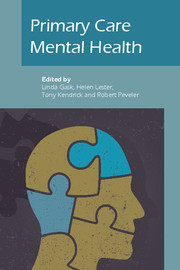Book contents
- Frontmatter
- Contents
- List of figures, tables and boxes
- List of contributors
- Preface
- Part I Conceptual basis and overarching themes
- Part II Clinical issues
- 8 Depression
- 9 Suicide and self-harm
- 10 Anxiety
- 11 Medically unexplained symptoms
- 12 Mental health problems in older people
- 13 Perinatal mental health
- 14 Child and adolescent mental health
- 15 Psychosis
- 16 Emergencies in primary care
- 17 Substance misuse
- 18 Management of alcohol problems
- 19 Eating disorders
- 20 Physical health of people with mental illness
- 21 Ethnic minorities
- 22 Asylum seekers and refugees
- 23 Sexual problems
- Part III Policy and practice
- Part IV Reflective practice
- Epilogue: Racing pigeons and rolling rocks: reflections on complex problems in primary care
- Index
18 - Management of alcohol problems
from Part II - Clinical issues
Published online by Cambridge University Press: 02 January 2018
- Frontmatter
- Contents
- List of figures, tables and boxes
- List of contributors
- Preface
- Part I Conceptual basis and overarching themes
- Part II Clinical issues
- 8 Depression
- 9 Suicide and self-harm
- 10 Anxiety
- 11 Medically unexplained symptoms
- 12 Mental health problems in older people
- 13 Perinatal mental health
- 14 Child and adolescent mental health
- 15 Psychosis
- 16 Emergencies in primary care
- 17 Substance misuse
- 18 Management of alcohol problems
- 19 Eating disorders
- 20 Physical health of people with mental illness
- 21 Ethnic minorities
- 22 Asylum seekers and refugees
- 23 Sexual problems
- Part III Policy and practice
- Part IV Reflective practice
- Epilogue: Racing pigeons and rolling rocks: reflections on complex problems in primary care
- Index
Summary
Alcohol plays an important role in many societies. Over 90% of adults in the UK – nearly 40 million people – consume alcohol, and it is widely associated with pleasure and relaxation. Drinking in moderation can also confer some health benefits (Cabinet Office Strategy Unit, 2003). Sensible drinking may:
• reduce the risk of developing heart disease and peripheral vascular disease
• reduce the risk of dying of a heart attack
• possibly reduce the risk of strokes, particularly ischaemic strokes
• lower the risk of gallstones
• possibly reduce the risk of diabetes.
Alcohol makes a substantial contribution to the UK economy, with the drinks market generating approximately one million jobs and excise duties on alcohol raising about £7 billion per year (Cabinet Office Strategy Unit, 2003).
However, alcohol contributes 4% to the total disease burden worldwide, as measured by disability-adjusted life years (DALYs) (Rehm et al, 2003). This burden is greater in high-income countries (9% DALYs), where alcohol ranks third after smoking and hypertension among the leading causes of morbidity and premature death.
The costs of alcohol misuse in the UK are around £20 billion a year (Cabinet Office Strategy Unit, 2003), with £1.7 billion directly related to health costs. In the UK, alcohol-related disease accounts for 1 in 26 hospital bed days and up to 35% of all attendances at accident and emergency departments and ambulance costs. Up to 150 000 hospital admissions are related to alcohol misuse. It has also been estimated that 1 in 15 doctors may, at some time, experience problems with drugs or alcohol (British Medical Association, 1998) (see Chapter 32 for further discussion of this issue).
The World Health Organization (WHO) has been committed to reducing the burden of alcohol-related problems for over three decades (Brunn et al, 1975). The first WHO European Alcohol Action Plan was introduced in 1992. It aimed to reduce consumption by 25% and had a particular focus on reducing harmful use, although in fact only three countries (Italy, Poland and Spain) achieved this target (Institute of Alcohol Studies, 2003).
- Type
- Chapter
- Information
- Primary Care Mental Health , pp. 267 - 282Publisher: Royal College of PsychiatristsPrint publication year: 2009



